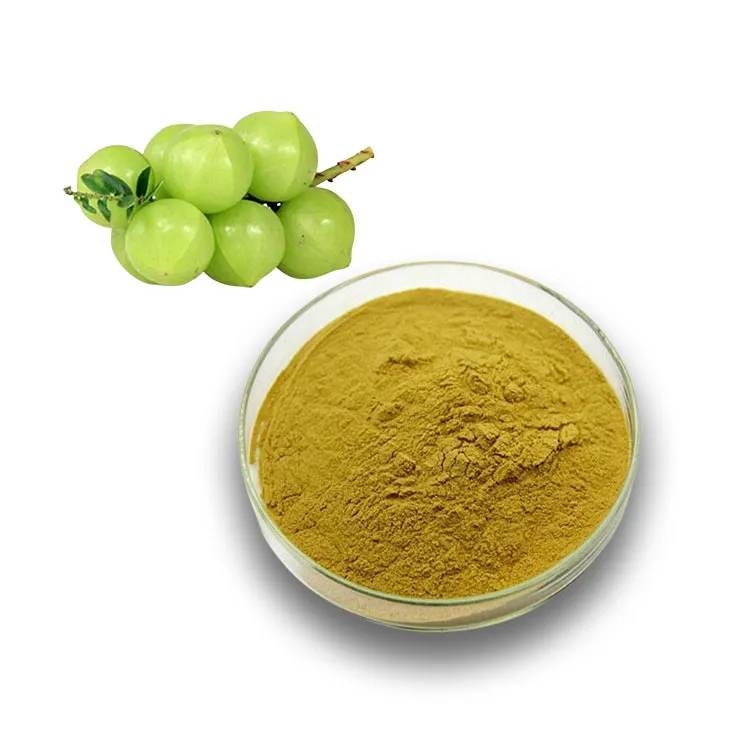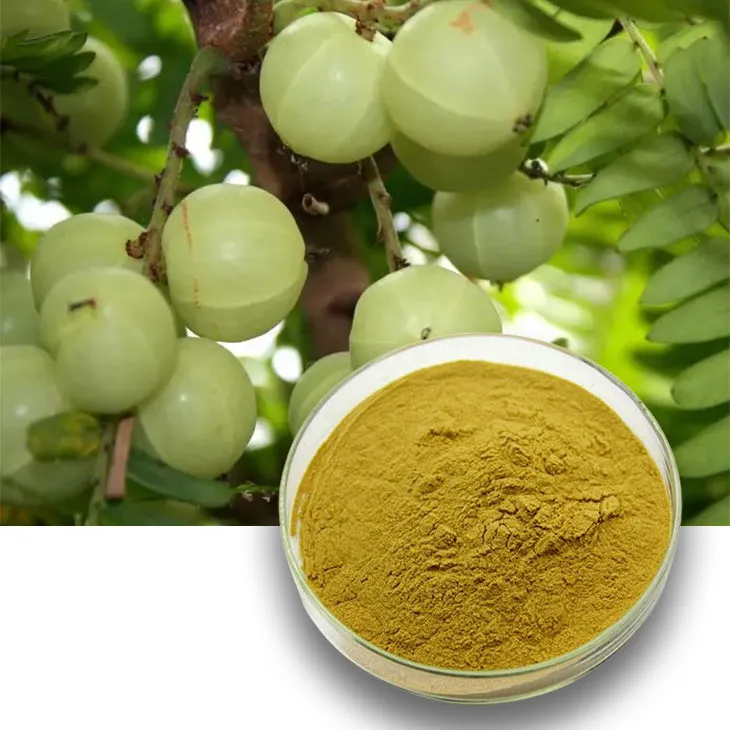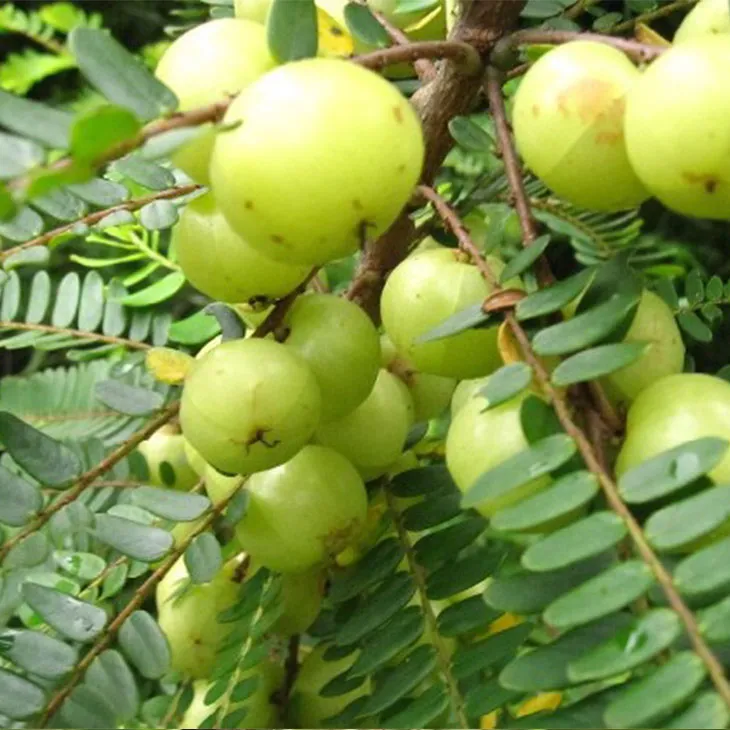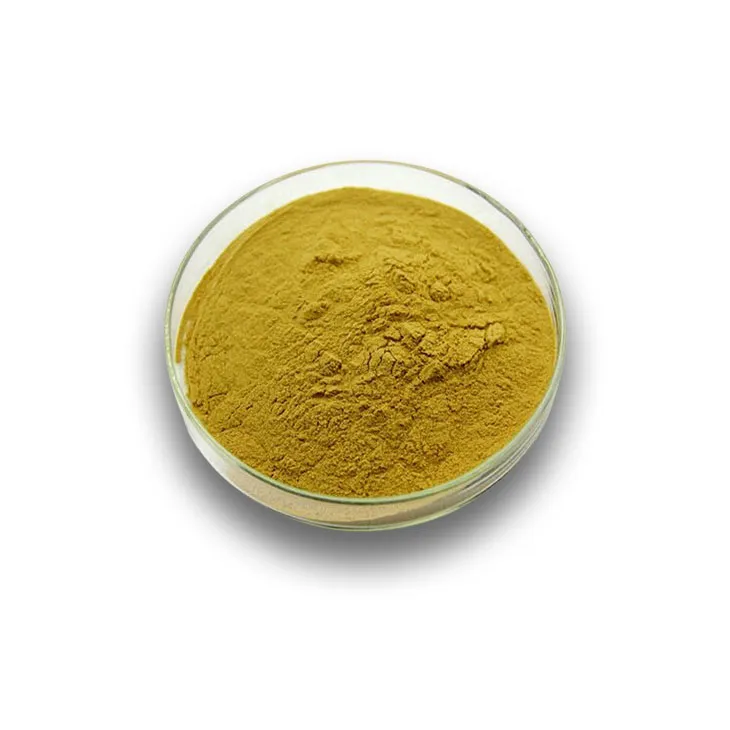- 0086-571-85302990
- sales@greenskybio.com
Benefits of Phyllanthus emblica extract in cattle feed.
2024-11-11

1. Introduction
Cattle farming is an important agricultural activity around the world. The quality of feed plays a crucial role in the growth, health, and productivity of cattle. In recent years, there has been an increasing interest in exploring natural additives for cattle feed, and Phyllanthus Emblica Extract is one such promising candidate. Phyllanthus emblica, also known as Indian gooseberry, has been used in traditional medicine for various purposes. Its extract contains a rich profile of bioactive compounds that can potentially bring multiple benefits when incorporated into cattle feed.

2. Nutritional Benefits
2.1 Energy Metabolism Enhancement
One of the significant nutritional benefits of Phyllanthus Emblica Extract in cattle feed is its role in enhancing energy metabolism. Cattle require a sufficient supply of energy for various physiological processes such as growth, reproduction, and lactation. The extract may contain certain compounds that can influence the metabolic pathways related to energy utilization.
- It may stimulate enzymes involved in the breakdown of carbohydrates, fats, and proteins in the digestive system. For example, it could enhance the activity of amylases that break down starch into simpler sugars, which can be more easily absorbed and utilized for energy production.
- Additionally, it might play a role in the mitochondrial function, which is the powerhouse of the cell where most of the energy is generated. By improving mitochondrial efficiency, cattle can produce more adenosine triphosphate (ATP), the energy currency of the cell, from the nutrients they consume.
2.2 Supply of Essential Nutrients
Phyllanthus Emblica Extract can also contribute to the supply of essential nutrients in cattle feed.
- It is a source of vitamins such as vitamin C. Vitamin C is not only important for the general health of cattle but also plays a role in collagen synthesis. Collagen is a key component of connective tissues in the body, including those in the muscles and bones. Adequate collagen synthesis is essential for the proper growth and development of cattle.
- The extract may also contain minerals in trace amounts. These minerals can participate in various physiological functions. For instance, they may be involved in enzyme activation, nerve function, and muscle contraction.

3. Health - related Benefits
3.1 Natural Antimicrobial Agent
In the digestive tract of cattle, the presence of harmful bacteria can lead to various health problems and reduced feed efficiency. Phyllanthus emblica extract can act as a natural antimicrobial agent.
- It contains bioactive compounds such as tannins. Tannins have been shown to have antimicrobial properties. They can bind to the cell walls of bacteria, disrupting their structure and function. This can inhibit the growth and reproduction of harmful bacteria such as Escherichia coli and Salmonella in the gut of cattle.
- By reducing the number of harmful bacteria, the extract can help to maintain a healthy balance of the gut microbiota. A balanced gut microbiota is crucial for proper digestion and absorption of nutrients. It can also enhance the immune function of the gut, as the beneficial bacteria in the gut can stimulate the immune system and protect against pathogenic invaders.
3.2 Anti - inflammatory Effects
Inflammation in the body of cattle can be caused by various factors such as infections, stress, or poor diet. Phyllanthus emblica extract may possess anti - inflammatory effects.
- The bioactive compounds in the extract can modulate the immune response and reduce the production of inflammatory mediators. For example, it may inhibit the release of cytokines such as interleukin - 1 and tumor necrosis factor - α, which are involved in the inflammatory process.
- This anti - inflammatory property can be beneficial in cases where cattle experience inflammation - related conditions. For instance, it can help to reduce inflammation in the joints, which is common in older cattle or those with joint - related disorders. It can also improve the overall well - being of cattle and potentially increase their productivity.

4. Stress Tolerance
Cattle are often exposed to various stressors in different environmental and management conditions. These stressors can include changes in temperature, humidity, feed quality, and handling procedures. Phyllanthus emblica extract may contribute to the stress tolerance of cattle.
- It can act as an antioxidant. Stress can lead to an increase in the production of reactive oxygen species (ROS) in the body. ROS can cause oxidative damage to cells, including damage to DNA, proteins, and lipids. The antioxidant compounds in the Phyllanthus emblica extract can scavenge ROS, reducing the oxidative stress on the cells of cattle.
- The extract may also influence the hormonal response to stress. It could help to regulate the release of stress hormones such as cortisol. By maintaining a more balanced hormonal state, cattle can better adapt to stressors and maintain their normal physiological functions.

5. Growth and Productivity
The combination of nutritional, health - related, and stress - tolerance benefits of Phyllanthus emblica extract ultimately leads to improved growth and productivity in cattle.
- In terms of growth, better energy metabolism, supply of essential nutrients, and reduced inflammation can promote muscle development and bone growth. Young cattle that are fed with feed containing Phyllanthus emblica extract may reach their market weight more quickly and with better body conformation.
- For productivity, lactating cows can benefit from the improved health and stress tolerance. They may produce more milk of better quality. The milk may have higher levels of nutrients and lower levels of somatic cell count, which is an indicator of udder health.
- In breeding cattle, the overall health and well - being provided by the extract can improve reproductive performance. This can include better conception rates, reduced embryonic mortality, and healthier offspring.
6. Considerations for Incorporating Phyllanthus emblica extract into Cattle Feed
While Phyllanthus emblica extract shows great potential as an additive in cattle feed, there are several considerations to keep in mind.
- Dosage: Determining the appropriate dosage of the extract is crucial. Too low a dosage may not provide the desired benefits, while too high a dosage could potentially have negative effects. Research is needed to establish the optimal dosage range based on the age, weight, and physiological state of the cattle.
- Formulation: The extract needs to be incorporated into the feed in a suitable formulation. It should be evenly distributed throughout the feed to ensure that all cattle receive an adequate amount. Additionally, the formulation should be stable and not degrade during storage or handling.
- Safety and Quality Control: The source of the Phyllanthus emblica extract should be from reliable suppliers. Quality control measures should be in place to ensure that the extract is free from contaminants such as pesticides, heavy metals, and harmful microorganisms. Safety studies should also be conducted to ensure that there are no long - term adverse effects on cattle health.
7. Conclusion
In conclusion, Phyllanthus emblica extract offers a range of benefits when added to cattle feed. Nutritionally, it enhances energy metabolism and supplies essential nutrients. From a health perspective, it acts as a natural antimicrobial and anti - inflammatory agent. It also contributes to stress tolerance, which in turn improves growth and productivity. However, further research is still needed to optimize its use in cattle feed, taking into account factors such as dosage, formulation, safety, and quality control. With proper implementation, Phyllanthus emblica extract has the potential to be a valuable addition to the cattle feed industry, leading to more sustainable and efficient cattle farming.
FAQ:
1. How does Phyllanthus emblica extract enhance energy metabolism in cattle?
Phyllanthus emblica extract may contain certain bioactive compounds that can interact with the metabolic pathways in cattle. These compounds might influence enzymes involved in energy production, such as those in the glycolysis or citric acid cycle. By optimizing these enzymatic processes, the extract helps in more efficient breakdown and utilization of nutrients from the feed, thus enhancing energy metabolism.
2. What specific harmful bacteria can Phyllanthus emblica extract reduce in the cattle's digestive tract?
Research has shown that it may have an inhibitory effect on bacteria like Escherichia coli and Salmonella. The antimicrobial properties of Phyllanthus emblica extract can disrupt the growth and survival mechanisms of these harmful bacteria. For example, it may interfere with their cell wall synthesis or protein production, thereby reducing their numbers in the digestive tract.
3. In what ways does Phyllanthus emblica extract improve the stress tolerance of cattle?
The extract may work by modulating the hormonal and immune responses in cattle. Under stress, certain hormones are released, and the immune system can be affected. Phyllanthus emblica extract could help regulate these hormonal imbalances and boost the immune system. It might also have antioxidant properties that can protect cells from damage caused by stress - related oxidative stress, ultimately improving the overall stress tolerance of cattle.
4. How much Phyllanthus emblica extract should be added to cattle feed?
The appropriate amount of Phyllanthus emblica extract to be added to cattle feed depends on various factors such as the age, weight, and overall health of the cattle, as well as the composition of the existing feed. Generally, it is recommended to start with a small dose and gradually increase while closely monitoring the cattle's response. However, more research is needed to establish precise dosage guidelines.
5. Are there any potential side effects of using Phyllanthus emblica extract in cattle feed?
So far, no significant side effects have been reported when using Phyllanthus emblica extract in cattle feed at appropriate levels. However, if over - dosed, it could potentially disrupt the normal balance of the digestive tract microbiota or cause mild digestive disturbances. As with any feed additive, proper dosage and quality control are essential.
Related literature
- The Nutritional and Health Benefits of Phyllanthus emblica in Livestock Nutrition"
- "Phyllanthus emblica Extract: A Promising Additive for Cattle Feed Quality Improvement"
- "Evaluating the Role of Phyllanthus emblica in Enhancing Cattle Stress Tolerance and Productivity"
- ▶ Hesperidin
- ▶ citrus bioflavonoids
- ▶ plant extract
- ▶ lycopene
- ▶ Diosmin
- ▶ Grape seed extract
- ▶ Sea buckthorn Juice Powder
- ▶ Beetroot powder
- ▶ Hops Extract
- ▶ Artichoke Extract
- ▶ Reishi mushroom extract
- ▶ Astaxanthin
- ▶ Green Tea Extract
- ▶ Curcumin Extract
- ▶ Horse Chestnut Extract
- ▶ Other Problems
- ▶ Boswellia Serrata Extract
- ▶ Resveratrol Extract
- ▶ Marigold Extract
- ▶ Grape Leaf Extract
- ▶ blog3
-
Cranberry Plants and Skin - care Products.
2024-11-11
-
Pomegranate Extract
2024-11-11
-
Green coffee bean Extract
2024-11-11
-
Apricot Powder
2024-11-11
-
Natural grape seed extract
2024-11-11
-
Artichoke Extract
2024-11-11
-
Epimedium extract powder
2024-11-11
-
Dandelion Root Extract
2024-11-11
-
Rose Hip Extract
2024-11-11
-
Reishi mushroom extract
2024-11-11
-
Grape Seed Extract
2024-11-11





















